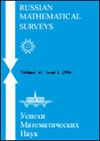Non-Abelian Euler top
IF 2.1
4区 数学
Q1 MATHEMATICS
引用次数: 0
Abstract
In [1], [2] a general approach to constructing integrable non-commutative generalizations of a given integrable system with polynomial right-hand side was proposed. We apply it to finding non-commutative analogues of the Euler top. Consider the system of ODEs u′ = z1 vw, v′ = z2 uw, w′ = z3 uv, zi ∈ C, zi ̸= 0, (1) where ′ means the derivative with respect to t. The system (1) possesses the first integrals I1 = z3u − z1w and I2 = z3v − x2w. For any i and j, the system uτ = z1 vwI 1I j 2 , vτ = z2 uwI i 1I j 2 , wτ = z3 uvI i 1I j 2 (2)非阿贝尔欧拉顶
在[1],[2]中,提出了构造具有多项式右手边的给定可积系统的可积非交换推广的一般方法。我们将它应用于寻找欧拉顶的非交换类似物。考虑常微分方程组u′=z1-vw,v′=z2-uw,w′=z3-uv,zi∈C,zi̸=0,(1)其中′表示关于t的导数。系统(1)具有第一积分I1=z3u−z1w和I2=z3v−x2w。对于任何i和j,系统uτ=z1 vwI 1I j2,vτ=z2 uwI i 1I k2,wτ=z3 uvI i 1I j2(2)
本文章由计算机程序翻译,如有差异,请以英文原文为准。
求助全文
约1分钟内获得全文
求助全文
来源期刊
CiteScore
1.70
自引率
0.00%
发文量
12
审稿时长
>12 weeks
期刊介绍:
Russian Mathematical Surveys is a high-prestige journal covering a wide area of mathematics. The Russian original is rigorously refereed in Russia and the translations are carefully scrutinised and edited by the London Mathematical Society. The survey articles on current trends in mathematics are generally written by leading experts in the field at the request of the Editorial Board.

 求助内容:
求助内容: 应助结果提醒方式:
应助结果提醒方式:


